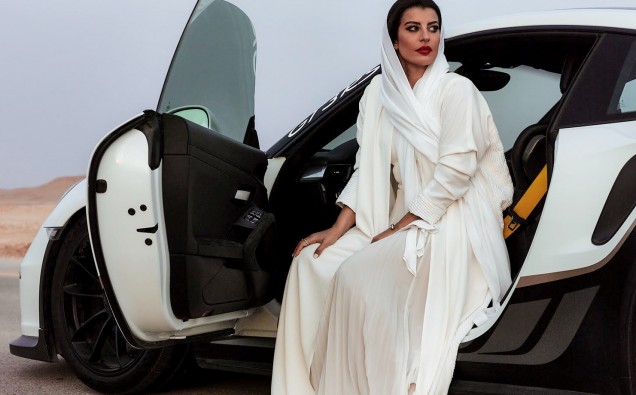The Women’s World Car of the Year (WWCOTY), is pleased to announce that Aseel Al Hamad, Saudi Arabia Representative at the FIA Women in Motorsports Commission and Board Member at the Saudi Automobile & Motorcycle Federation, has joined its international jury. WWCOTY is the only car awards in the world composed exclusively of women motoring journalists, and with Aseel’s appointment, now features 74 judges from 50 countries.
The addition of Aseel Al Hamad is particularly important because she is the first female Board Member on the Saudi Automobile & Motorcycle Federation (SAMF). She regularly speaks and mentors the Saudi workforce and is often featured in the media as a figurehead for female empowerment, and an inspirational representative of the Saudi 2030 vision for leadership and positive change.
Aseel is a motorsports advocate, having taught herself to drive in Dubai, years before women were allowed to drive in KSA. She started racing from an early age, in 2000, testing her skills in amateur tournaments and building her profile as a female automotive figurehead. In June 2018, Aseel took part in a milestone moment in regional history, completing a victory lap at Paul Ricard in Le Casetellet in France, at the guest of Renault, to mark the lifting of the Saudi female driving ban.
Most recently, Aseel co-founded STEER a Saudi licensed travel company that specializes in supercar automotive tours that explore the beauty of Saudi Arabia. The mission is to promote domestic tourism in the Kingdom through immersive automotive experiences.
Aseel comments, “I am incredibly proud of my new role supporting Women’s World Car of the Year, as we are aligned in our mission to enhance female empowerment in the automotive and motorsport industry. This has traditionally been perceived as a male dominant world, and through our work, we are dedicated to correcting the balance”.
Aseel is the first Saudi Arabian women to import and own a Ferrari since 2012, years before women were allowed to drive in KSA. She has participated in many amateur tournaments with her talent and commitment to her path leading her to becoming a member of the International Automobile Federation.
Her appointment to the WWCOTY jury highlights the new role that women have begun to play in this Arab country, especially in the sports and entertainment industry. Since the introduction of the Vision 2030’s plans, it opened up many business and investment opportunities.
Saudi Arabia has invested heavily in attracting high-profile sporting and automotive events in recent years as part of its Vision 2030 agenda. The country hosted mega global events for the first time in its history, such as the Dakar Rally, the Formula E, the Formula One, and others. It also built a new racing track to hosted Formula drivers since 2021. The Kingdom signed agreements to host the MotoGP, and the World Rally Championship round. There are plans for developing the racing industry and the country introduced Formula 4 academies for young drivers, and is constructing a permanent circuit where the Grand Prix will take place in 2026.
Sports and entertainment will play a crucial role to attract tourists.
The Middle East/North Africa (MENA) region, where Aseel Al Hamad works and lives, is growing at an estimated 36% with Saudi Arabia as the leading market. Saudi Arabia accounted for almost 35% in the MENA region in 2020.
The majority of households in Saudi Arabia own or drive a car. Medium and big cars are more common than smaller cars. In 2021, Saudi Arabia imported $12.1B worth of cars, becoming the 13th largest importer in the world. At the same year, automobiles were the most imported product in Saudi Arabia primarily from Japan, China, United States, South Korea and Germany.
Saudi Arabia also moves towards building local content. According with the country’s Vision 2030 goals, the National Industrial Development Center aims to attract 3-4 Original Equipment Manufacturers. The goal is to produce 300,000 vehicles annually with 40% local content by 2030. NIDC provides incentives to enable industrialization through loans, tax incentives and tariff exemptions.

















